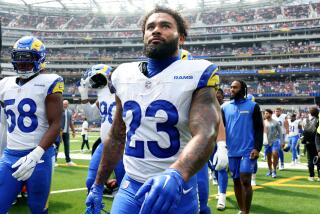THE PIECES DON’T FIT
- Share via
MILFORD, N.J. — MILFORD, N.J. -- No one here is sure how to reconcile the two Jayson Williamses. There’s the fellow who rides a gleaming chrome beast of a motorcycle and walks into a local joint and tells the bartender: I’m buying drinks for the house.
He’s the 6-foot-10 bon vivant, a pool-shooting pal of carpenters and electricians and celebrities, too. Impossibly wealthy and witty, he’s got a bestselling book on his days in the National Basketball Association--”Loose Balls”--and a career as a sports commentator on NBC-TV.
He throws fundraisers for kids with cancer and has adopted the children of his dead sisters. A few weeks back, he took an arthritic goat from a local animal shelter and brought it to be cared for at his 31,000-square-foot mansion, a place named “Who Knew?”
The other Jayson Williams faces manslaughter charges. He’s a retired jock fond of guns and booze, a fellow who threw a party on Feb. 14 and, prosecutors say, twirled a loaded shotgun--until it went off and the blast hit his chauffeur full in the chest.
The limousine driver died in Williams’ bedroom.
Williams, 34, walked into Kingwood Township state police barracks this past Monday. The police fingerprinted and photographed him, and Williams posted $250,000 bail.
By the time he walked out, his life had become a cliche, rendered in news accounts as that of another pro athlete with too much money, too much arrogance and too little judgment.
Except nothing about Williams’ life or this incident tracks quite so neatly. This is a man about whom Sports Illustrated wrote in 1999: “More than any other player, Williams makes sure that the face of the NBA has a smile on it.” Even prosecutors have noted there is no evidence that Williams intended to hurt anyone that night.
No one even says he was angry.
But Williams is a retired pro athlete. And he has discovered that life’s defining moments are as often accidental.
Williams came of age on Manhattan’s Lower East Side, a self-described “knucklehead.” His mother was of Italian descent, his father African American. In the sensitive argot of his neighborhood, kids nicknamed him “Zebra.”
He fills his book with tales of his scrapes and belt-straps swatted across his butt. When he was 12, a junkie mugged his oldest sister, Linda. She survived the attack but contracted AIDS from the blood transfusions.
She died when he was 15. Five years later, his other sister, Laura, also died of AIDS. They both left children behind. Williams, raised a Catholic, felt adrift from any notion of God’s mercy.
He was 6-6 when he arrived at Christ the King High School in Queens, a hoops powerhouse. A half-dozen pros once worked their way through its halls.
At St. John’s University, Williams tossed a metal chair at a fan, argued with his coach and threatened to quit a dozen times. Then he shut up and stayed and graduated, crediting his coach, Louie Carnesecca, and his father, E.J. Williams.
His early years in the NBA were not auspicious.
He was traded from Phoenix to Philadelphia, just another brawling scrub best known as Charles Barkley’s after-hours running partner. “He probably cost me about four years off my life,” Williams wrote. “Because of [him], my liver is about the size of two footballs.”
The narrative works this way: Williams gets traded to New Jersey, meets a former NBA great--coach Paul Silas--and is persuaded to turn his life around. Williams buys into that story, sort of.
“I got a big contract in 1998 because I’m a good citizen, and a good teammate and I don’t do some of the wild stuff I used to,” he wrote. “But mostly I got the money because I rebound.”
In fact, his career ended just two years later, after he suffered two bone fractures. But the Nets agreed to make good on his $86 million contract. He began a career as a television analyst.
He has adopted two of his sisters’ children, donated $2.5 million to St. John’s and devoted hundreds of hours to raising money for AIDS charities.
But the other Jayson Williams never quite disappeared. In 1994, Williams fired a pistol at the hubcap of a van parked outside the Nets’ arena. Williams was arrested, although his police record was expunged after he took out newspaper advertisements urging children not to use guns.
About two years ago, Williams was hanging out at his estate, barbecuing for Jets wide receiver Wayne Chrebet and some other guys. They walked over to his private shooting range, where everyone took turns firing a .50-caliber Desert Eagle.
Williams fired without checking who was around him. His blast missed Chrebet’s face by inches, the concussion knocking the football player unconscious.
The moment played as comedy in his telling, and didn’t scare him away from guns.
On Feb. 13, Williams was in a splendid mood. He went down to Pennsylvania to see a Harlem Globetrotters game. Then Costas “Gus” Christofi, the limousine driver, took him and his friends back to Williams’s mansion.
Williams insisted on giving everyone, Christofi included, a tour of the mansion. They walked past the indoor basketball court, the pool, the par-3 golf course and the movie theater. At some time after midnight, as they walked upstairs, Williams playfully twirled a shotgun in his hand, according to prosecutors.
The gun went off and Christofi was hit. Prosecutors are still examining whether Williams was drunk.
Williams has remained secluded in his mansion. His lawyer and agent did not respond to requests for an interview. His friends say he feels terrible, he’s praying. He had hoped this home would stand as a symbol of everything that had gone right in his life.
More to Read
Sign up for Essential California
The most important California stories and recommendations in your inbox every morning.
You may occasionally receive promotional content from the Los Angeles Times.













